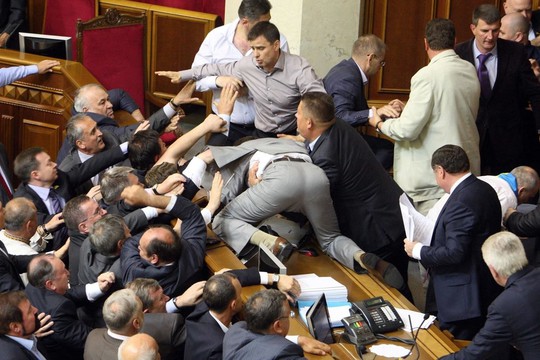Fights in the Ukrainian parliament are commonplace.
Photo: sueddeutsche.de
Ukraine’s Parliament is in a state of disarray, writes ‘The New York Times’.
Under martial law, with the country at war, no elections are possible to replace members who switched jobs, joined the army, fled the country or quit. The Parliament regularly gathers with more than 10 percent of its lawmakers absent.
Though legally obliged to attend hearings when summoned, ministers sometimes do not show up, without repercussions.
President Volodymyr Zelensky’s party, once a political juggernaut, has in effect lost its majority by unraveling into factions. To pass key bills, it is forced to rely on support from lawmakers who belonged to a now-banned pro-Russian party.
The overall picture, said Volodymyr Fesenko, a Ukrainian political analyst, is of a Parliament sidelined during the war and slipping from its once powerful role in Ukrainian democracy.
“In a state of martial law, with our centralization of state management and the end of public politics, Parliament lost its influence,” Mr. Fesenko said.
The dysfunction in Parliament, and the unusual voting alliance between the governing party and former members of the disbanded pro-Russian party, has dented the government’s credibility as it struggles to reset its war effort after months of Russian advances.
The disarray thwarts any meaningful role for the Parliament in the oversight of government agencies, critics say, even as billions of dollars in foreign aid money pours into Ukraine. Accusations of corruption or mismanagement emerge regularly: In May, an official overseeing mostly Western-financed reconstruction in Ukraine resigned, citing poor management of funds.
The tumult has also intensified criticism that too much power is concentrated in the president’s office, beyond what is already granted under martial law. That has been a focus of Mr. Zelensky’s critics since the beginning of the war, when he consolidated television outlets under one state-run station and curbed the ability of ministers to act independently.
Nobody is alleging serious infractions of the Constitution.
Under the Constitution, Ukraine’s Parliament is intended to wield more power than the presidency. Parliament appoints most ministers and approves the smaller number appointed by the president. It has played pivotal, independent roles in past crises. But not during this war.
Part of the problem is that Mr. Zelensky’s party, called Servant of the People, is itself hindered by turf wars and infighting.
Divisions that emerged before the invasion have only deepened. The unanimous votes that signaled solidarity early in the invasion are a faded memory. The war muddles party discipline; rogue voting is grudgingly tolerated.
In one example, about 20 members of Parliament have formed a faction opposed to Mr. Zelensky; 15 of them formally remain in the president’s party.
A spokeswoman for Davyd Arakhamia, the leader of the Servant of the People faction in Parliament, declined an interview for scheduling reasons and a spokeswoman for Ruslan Stefanchuk, the speaker of Parliament, did not respond to a request for an interview. The office of Mr. Zelensky did not respond to a request for comment.
read more in our Telegram-channel https://t.me/The_International_Affairs

 12:13 19.07.2024 •
12:13 19.07.2024 •























